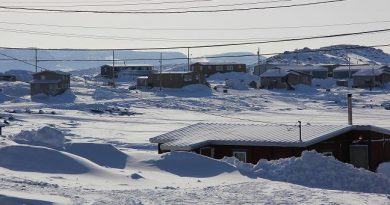Cool Down the Rhetoric
In 2004, the Arctic Council released a scientific report – the Arctic Climate Impact Assessment – that pretty solidly outlined the occurrence of warming in the Arctic and the implications such warming would have on Northerners. While international attention on the Arctic focused, for a short while, on climate change and polar bears, it did not take long for governments, corporations and academics to put two and two together and realize that a melting ice cap (no longer a hypothetical) would result in open shipping routes and newly accessible oil, gas and mineral reserves.
When the Russians planted a flag on the seabed at the North Pole in August 2007 (Peter Mackay called it a stunt; for the Russians it was an impressive scientific and technical achievement), the same month that Stephen Harper announced a series of military investments in the Canadian North, the press had a field day with all of the metaphors offered so readily in the North – a New ‘Cold’ War; Arctic Relations on Thinning Ice; an Arctic Race etc etc. (Ok, guilty as charged – see title of blog. It’s just so easy!) The sudden importance of the Arctic in geopolitical circles was only reinforced by the skyrocketing price of oil in 2008 – at $147 a barrel, offshore Arctic oil was getting pretty close to being profitable. The rising Russian Bear and a China hungry for energy and resources all led to a new phase in circumpolar relations. Once devoted to environmental and indigenous affairs, the Arctic has become a veritable region of geopolitical significance in the past five years.
A perception, due in no small part to the sensationalizing of events by the media and a cadre of politicians (mostly Russian and Canadian) eager to cash in on the nationalism invoked by ‘defending the Arctic’, has arisen that tensions are precariously high and that a dispute may break out between the Arctic nations. And if we are to be honest, what we’re really worried about is that Russia will do something provocative and we’ll a) have a conflict between the West and Russia! or b) be humiliated into surrendering some part of our territory, because hey, no one wants to have a conflict between the West and Russia! It’s worth dispelling some of the myths that Harper’s “use it or lose it” rhetoric has engendered:
1) There is no ‘race’ for the Arctic:
What’s happening is actually more of a very slow crawl. In 1982 the UN Convention on the Law of the Sea was concluded, and it allowed states to claim jurisdiction of the continental shelf up to 350 miles from their coastline. None of the Arctic states even bothered to prepare a claim for almost two decades because of the cost, firstly, of establishing the scientific evidence in the Arctic for such a claim; and second, because of the dubious value of having mineral rights to seabed covered almost permanently in ice, deep under the water, and far from any markets or supportive infrastructure. With the prospect of a seasonally ice-cap free Arctic in the next fifty years, states finally figured it was worth claiming the maximum amount allowable by the Convention. Russia submitted first in 2001, but was asked to resubmit with additional scientific evidence. Norway submitted in 2006. Canada has until 2013 and Denmark (Greenland) until 2014 (10 years respectively after which they ratified the Law of the Sea). The US is not a signatory and thus has no deadline, but it is still mapping the area to see what it has. Even after submissions are made, it will likely take the Commission in charge of such claims years to sift through the evidence, process any appeals and make a decision. The Arctic states have been working together to try to pool geological information and mapping resources and come to an understanding on their respective claims together, without the involvement of the Commission – hardly a hostile situation.
It’s possible, even likely, that Canada, Denmark and Russia will have a squabble over a portion of the Lomonosov Ridge, a deepwater mountain range pretty much square under the North Pole. But no one expects it to hold much oil or gas wealth at any rate. If it ever becomes profitable to drill and exploit that particular piece of the Earth’s real estate, we’ll have much greater problems than an Arctic territorial dispute. The point is, it’s hardly anything to fight over. The Arctic states will claim what they can, because that’s what states do. But almost everything worth having – and with today’s technology, everything that can be gotten – is within the established 200-mile Exclusive Economic Zones. And when it comes to building multi-billion dollar oil rigs in environmentally sensitive areas, no one’s going to foot the bill for an exploration in a disputed area. Add to that a global recession, the BP spill in the Gulf of Mexico, middling oil prices and the new accessibility of gas from shale, and you can expect the exploitation of resources in the Arctic to take some time.
2) Canada is not at risk of ‘losing’ any of its Arctic territory:
Seems some people think if we don’t have enough icebreakers, Rangers, post offices or people in the Canadian North, someone else will get it instead by default. Our Prime Minister declaring that we must use or lose our Arctic didn’t help clarify matters much, and needlessly antagonized the 100,000 or so people that call the north their home. Not only is this legally not the case – there is no international benchmark for usage that compels violators to forfeit national territory – but no one else even claims our Arctic territory. There are two main exceptions. First is tiny Hans Island (not much bigger than a football field), between Ellesmere Island and Greenland in the Nares Strait. Canada and Denmark demarcated their maritime borders North and South of Hans Island in 1973 but, unable to agree on who owned Hans Island, omitted the 875 meters length of the island from their agreement. There are no oil, gas or mineral resources on the island, it is not a traditional hunting ground, nor is it of any significant ecological interest. Rumour is Canada and Denmark are in negotiations to resolve the dispute like grown-ups, probably splitting the inconsequential little island in the middle.
The other noteworthy dispute, guaranteed to raise Canadian hackles, is of course the Northwest Passage. This one is worth a full blog, but it’s sufficient to point out here that Canada has the undisputed right to any resources, living or non-living, in the NWP, as it falls in our EEZ. The Americans for their part claim that the NWP is an international strait, subject to international law, giving them the right of transit passage, while Canada claims it’s internal waters subject to Canadian law. Let’s assume we don’t want to close off our waters to all shipping, just to vessels that are polluting or engaging in criminal activity. Well, international law wouldn’t stop us from picking up terrorists and smugglers. And as for the environment, well the kicker is that the international and domestic law governing the environmental regulation of Arctic waters is pretty much exactly the same – Canada’s Arctic Waters Pollution Prevention Act of 1973 being the basis for UNCLOS Article 234. Sure it would be nice to have it be Canadian, but the Americans probably won’t play ball, not because they want to begrudge us our Arctic pride, but to avoid setting a legal precedent for other similarly contested straits, for example in Gibraltar, Malacca and Taiwan. As Don McRae, an expert on the NWP, has written, in practice, almost nothing would change should the NWP become an international strait. So again, much ado about nothing.
(OK, there is a third exception, over a piece of the Beaufort Sea between Alaska and Yukon. But again, something for the lawyers, not the military.)
To make a long blog short, the Arctic has fairly recently become an important place, geopolitically speaking. Canada has an opportunity to capitalize on this importance, as a historic leader and large presence in the area. Focusing on rhetoric and competition is not going to help us capitalize on the many opportunities (and deal with the many challenges) that the Arctic’s new significance offers. It’s time to develop a more sophisticated policy for the Arctic.



